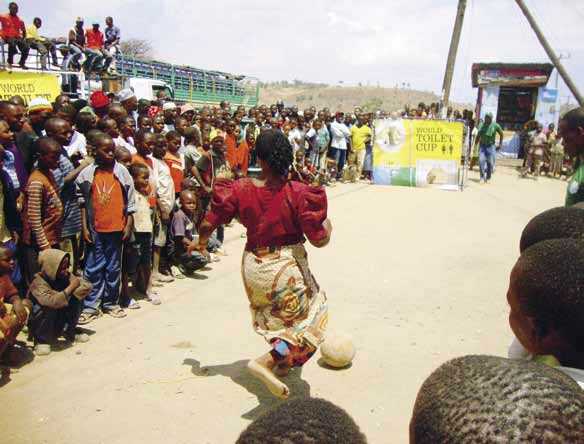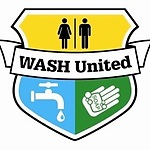WASH United: a club that promotes wellbeing
That’s why Thorsten Kiefer, human rights lawyer and devout football fan, founded WASH
United. “[I am] driven by the vision of a world in which all people can talk openly about toilets, shit and shitting, in which toilets and hygiene are cool and relevant, and in which all people enjoy the safety and dignity of a toilet and practice good hygiene,” Kiefer explains. That’s why WASH United is not just another civil society organisation. Rather, it positions itself as a club that unites some of the world’s biggest athletes with school children in Africa and India, as well as political decision makers, and people around the world. United, they make an effort to advance access to safe drinking water, sanitation, and hygiene for all people, everywhere. Together with a coalition of international and local civil society organisations, United Nations agencies, governments, and leading actors from
the world of sports, WASH United aims to create excitement around the neglected issues
of global sanitation and hygiene. It makes use of interactive games, superstar role models, and a healthy dose of fun to fundamentally change mindsets around the “dirty” issues of sanitation and hygiene and to facilitate behavioural change.
Joining hands to make hand washing“cool and sexy”
WASH United is designed as a brand that brings together the world of WASH (Water, Sanitation and Hygiene) with the world of football and taps right into the powerful visual language of professional football clubs—with its own code of arms, team shirts, and club rules. Similar to big football clubs like Manchester United, WASH United creates strong emotions of togetherness and a sense of identity among its members. In addition, it reinforces the commitment of club members to adhere to the WASH rules, which form the foundation of membership to the WASH United club. That’s how WASH United has become much more than just a project.
The medium is the message
The initial WASH United campaign leading up to the 2010 FIFA World Cup in South Africa reached more than 25 million people. WASH United’s positive football-based communication has opened up completely new media channels for WASH topics. Major magazines as well as mainstream television broadcasts now raise WASH-related topics due to the appeal of associated international sports stars. Within the first year of campaigning, the WASH United club had already grown to some 32,000 members, most of whom joined through WASH school programmes. These programmes educate children and teachers in a fun and participatory way about the importance of safe drinking water, sanitation, and hygiene to facilitate life-saving behavioural changes.
Focus on continuous innovation
According to Kiefer, WASH United has been design-focused and innovation-driven from
day one. “We work with some great agencies [Südfeuer in Germany and Studio Miscellanea in India] and we simply love coming up with new beautiful out-of-the-box solutions to promote sanitation and hygiene.” WASH United developed and tested more than twenty new stall and arena games—including Poo Minefield, which turns out to be a real blockbuster. In this game, blindfolded contestants must rely on voice commands to get through an open defecation
zone and pick up soap bars for bonus points. In Kenya, WASH United is about to start a new project in which it collaborates with street artists from informal settlements to get sanitation and hygiene messaging out into their communities.
Project partners
WASH United is supported by a wide range of international partners that include international and local civil society organisations, United Nations agencies, governments, and leading figures from the world of football. In the target countries, WASH United activities are carried out with and by local partner organisations (both non-governmental and governmental), international partners’ country offices, and within WASH networks. WASH United currently works with approximately one hundred local organisations and networks that implement activities in the field.


Leave a comment